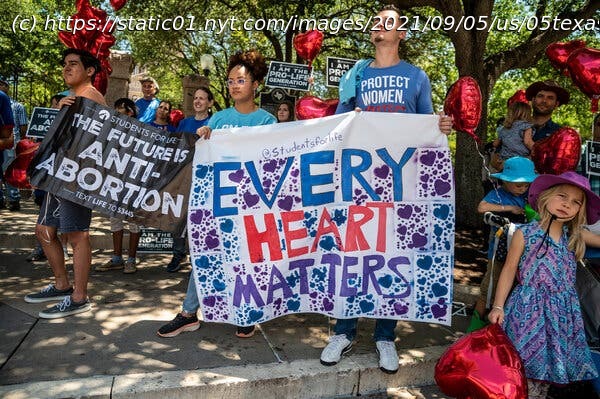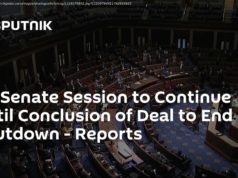Texans are almost evenly divided on abortion, but a combination of Republican control, conservative judicial appointments and cultural shifts helped the state’s anti-abortion movement find success.
A steady stream of women trickled into Prestonwood Pregnancy Center late last week, alone and with partners, with appointments and without. One couple held hands and whispered cheerfully; a young woman scrolled through her phone until her name was called. A wall-mounted screen in a corner cycled through a carousel of inspirational messages. “You are strong.” “Hope is stronger than fear.” “There are options.” Abortion clinics emptied out last week after a Texas law enacting a near-complete ban on abortion went into effect. But Prestonwood is not one of those clinics. It is instead among the state’s more than 200 “crisis pregnancy centers,” facilities aligned with anti-abortion organizations that offer free medical tests and counseling in hopes of dissuading women from terminating their pregnancies. These centers are sometimes located within eyesight of abortion clinics, and there are nearly 10 times as many of them, a sign of the extraordinary success of the state’s anti-abortion movement that led to the passage of the country’s most restrictive law. How Texas arrived at this moment was the culmination of years of Republican control, conservative judicial appointments and rising passion around abortion issues by many Christians in the state. Polls show Texans almost evenly divided on abortion access and the state’s cities have grown more Democratic, but it was the conservative abortion opponents who established a powerful political, cultural and even physical presence across the state’s vast terrain. In the race among conservative states to undo the constitutional right to an abortion — as established in 1973 by the landmark case, Roe v. Wade — Texas “feels an obligation to lead and be bold,” said John Seago, legislative director for Texas Right to Life, the state’s largest anti-abortion group. Indeed, because Roe v. Wade began in Texas, after an unmarried woman challenged the state’s criminal abortion laws, the modern anti-abortion movement in the state has felt compelled to push for its disintegration. “We started this moral tragedy, it’s ours to end,” said Chelsey Youman, the Texas State Director and National Legislative Advisor for Human Coalition Action, an anti-abortion group based in Frisco, Texas, near Dallas. The modern anti-abortion movement in Texas, however, did not begin with Roe v. Wade. “It did not immediately set off a reaction in Texas,” said Daniel K. Williams, a professor of history at the University of West Georgia. “For several decades, the issue really didn’t have much staying power.” At the time, the anti-abortion cause was primarily one pressed by Catholics, and it was strongest in Northern states with large Catholic populations. Evangelicals, dominant in the South, were largely moderate on the issue, generally opposing “on-demand” abortion but open to a variety of exceptions. A 1969 poll by the Baptist Standard found that 90 percent of Texas Baptists thought the state’s abortion laws were too restrictive. W.A. Criswell, a prominent Southern Baptist pastor in Dallas and former president of the Southern Baptist Convention, remarked in reaction to Roe v. Wade, “I have always felt that it was only after a child was born and had a life separate from its mother that it became an individual person.
Home
United States
USA — Political How the Texas Anti-Abortion Movement Helped Enact a Near-Complete Ban






